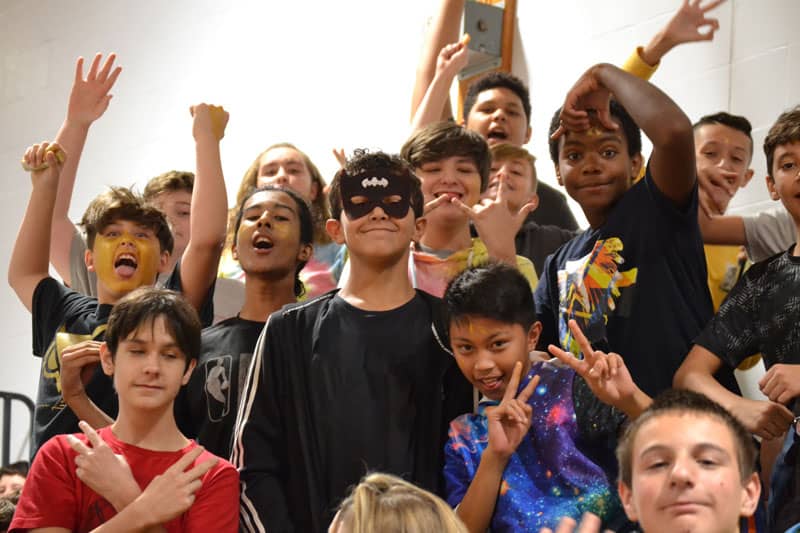“I’ve never met children so hungry to go to school before,” said Mrs. Lee.
Mr. and Mrs. Lee* have been teaching missionary kids (MKs) in creative access countries — countries where legal obstacles exist for an expatriate (or foreign) missionary to obtain a visa — for seven years.
Serving in these countries requires flexibility and creativity, and MKs have limited access to a quality education. To reach their students, the Lees use Modular Study Groups (MSGs), a non-traditional approach to education that looks quite different from typical Western-style classrooms.
TEACHING IN THE 10/40 WINDOW
When the Lees joined Wycliffe, their passion for helping those with the least access to Christianity have the Bible in their languages drove their decision to serve in the 10/40 window. This is a rectangular geographic area stretching from North Africa through the Middle East to Asia, covering 68 countries where two-thirds of the world’s population lives. The Lees wanted to use their teaching skills to support Bible translation. By meeting the vital education needs of missionary children, teachers like the Lees free up the parents to translate the Bible and focus on other ministries.
The Lees thought they would teach in an international school but changed course when they learned that teachers for Modular Study Groups (MSGs) were an urgent need.
MODULAR STUDY GROUPS
MSGs address the holistic needs of MKs while allowing families to stay in the locations they are called to serve. For three weeks a month, students pace themselves through assigned work. In the fourth week, students travel to a central location for intensive instruction, presentations, labs and tests. During this week, students stay in boarding houses or with other missionary families.

Not only do MSGs provide comprehensive instruction (the school day runs 8 a.m.-5 p.m.), but students who participate in MSGs experience deep friendships. This is a significant opportunity for the many MKs who live in remote villages and have limited interaction with their peers.
“In some ways, it’s more like a church camp experience than a boarding school,” said Mrs. Lee.
MSGs combine academic, social, spiritual and emotional development — and that makes the rigour of this unique schedule worth it. While teachers communicate with students and answer questions via email during the three-week homeschooling period, they actively engage with students in-person during the final week of the month for long hours each day.
The work pays off; students soak up the time with their mentors and build friendships with other missionary kids. These relationships are essential for the healthy development of MKs.
“Each student is a person first. We get to look at the hopes, desires and dreams they have. We get to pray for them and their families and their ministries,” said Mrs. Lee.
MAKING A DIFFERENCE
MSGs create connection. Students from MSGs have formed their own alumni groups and regularly connect online from all over the world. Students also get the opportunity to see what living life as a Christian looks like in a family other than their own, which is something that doesn’t often happen in more remote areas. Host families pour into MSG students via Bible studies, discussions about faith and providing safe spaces outside the weight of expectations that MKs often bear.
Secondly, MSGs help students learn independence and gain confidence. With three weeks of independent work each month, students develop grit and learn the value of productive struggle in academics and time management.
“Students who have taught themselves calculus are going to be ready for post-secondary education,” Mr. Lee explained.
The fourth week, students travel long distances from their villages to join their MSG — a trip they often make alone after an initial trip with a parent. After one student experienced a traumatic break-in at their home, he was very timid and fearful. But travelling to and from MSG has given him the skills to overcome his fears; he’s now confident, outspoken and takes on leadership roles.
MEETING HUNGER
In addition to being involved in a wide range of ministries themselves, teachers allow missionaries to live and invest in the communities God has called them to without sacrificing their kids’ educations.
“It’s the ideal teaching job,” said Mr. Lee. “You’re making a huge impact on student lives, you get to teach [and] you get to build relationships with students.”
The MSG model is growing! In creative access countries where families have few options for schooling, MSG provides schooling that meets the academic and social needs of middle and high school students. Many MSGs have long waiting lists for students who want to join. They desperately need more teachers to make an even larger impact in the lives of students, their families’ ministries and local communities.
Source: Adapted from a blog post written by Stacy Cawley at wycliffe.org
*pseudonyms used

